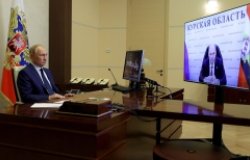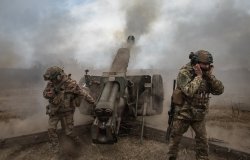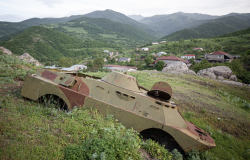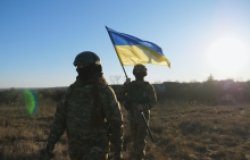Iran Primer IV: Iran and Its Neighbors
Michael Eisenstadt, Director, Military & Security Studies Program, Washington Institute for Near East Policy; Mark Katz, Professor of Government and Politics, George Mason University; Afshin Molavi, Senior Research Fellow, American Strategy Program, New America Foundation
Overview
In the fourth of a series of events featuring authors from The Iran Primer, panelists Afshin Molavi, Mark Katz, and Michael Eisenstadt discussed Iran's relations with its neighbors and provided insight into Iran's current and possible future roles in the region.
On March 15, 2011, the Middle East Program hosted a meeting on "Iran Primer IV: Iran and Its Neighbors" with Molavi, Senior Research Fellow, American Strategy Program, New America Foundation; Katz, Professor of Government and Politics, George Mason University; and Eisenstadt, Director, Military and Security Studies Program, Washington Institute for Near East Policy. USIP-Wilson Center Distinguished Scholar and editor of The Iran Primer Robin Wright moderated the event.
Molavi identified a distinct shift in Iran's relationship with the Persian Gulf states in the last decade. From 1989-2005, both President Akbar Hashemi Rafsanjani and his successor President Mohammad Khatami sought to establish diplomatic and commercial links with the Persian Gulf states. In 2005, President Mahmoud Ahmadinejad ushered in a new era in Iranian foreign policy and discontinued his predecessors' attempts to mend fences with the Gulf Cooperation Council (GCC). This new policy, combined with the effects of sanctions and regional disputes, has caused longstanding relationships such as that between Iran and the United Arab Emirates to suffer in recent years. Molavi also noted that Iran gave up its historical claim to Bahrain in 1970 and speculated that Iran is neither integrally involved in the current Bahraini crisis nor likely to send troops. In exploring the relationship between Russia and Iran, Katz noted that Russia appeared to be adopting a stricter stance towards Iran in 2010, but it has backpedaled since the start of 2011. Katz proposed two reasons for this shift: 1) the New START Treaty, and 2) the wave of democratic uprisings in the Middle East. The New START Treaty was important to Moscow, and Russia may well have courted U.S. favor to encourage its passing. Katz explained that once the U.S. Senate ratified the treaty in December 2010, Russia lost an incentive to cooperate with the United States on Iran. The revolutions in Egypt and Tunisia did not seem to concern Moscow, but Russian officials have strongly denounced the current uprisings in Libya. According to Katz, these officials may fear that a new, Western-style Libyan democracy could ally more closely with the United States and cause Libyan-Russian relations to deteriorate. He noted that Russia cultivated ties with Iran in part to prevent an Iranian-American rapprochement which could negatively affect Russian interests in the business and energy sectors.
In exploring the relationship between Russia and Iran, Katz noted that Russia appeared to be adopting a stricter stance towards Iran in 2010, but it has backpedaled since the start of 2011. Katz proposed two reasons for this shift: 1) the New START Treaty, and 2) the wave of democratic uprisings in the Middle East. The New START Treaty was important to Moscow, and Russia may well have courted U.S. favor to encourage its passing. Katz explained that once the U.S. Senate ratified the treaty in December 2010, Russia lost an incentive to cooperate with the United States on Iran. The revolutions in Egypt and Tunisia did not seem to concern Moscow, but Russian officials have strongly denounced the current uprisings in Libya. According to Katz, these officials may fear that a new, Western-style Libyan democracy could ally more closely with the United States and cause Libyan-Russian relations to deteriorate. He noted that Russia cultivated ties with Iran in part to prevent an Iranian-American rapprochement which could negatively affect Russian interests in the business and energy sectors.
Eisenstadt examined Iran's approach to projecting power in Iraq to illuminate various nuances about Iranian foreign policy. He explained that Iran operated in Iraq by supporting political allies, supplying revolutionary and insurgent groups, and utilizing soft power. The overall results of these approaches have been mixed. Eisenstadt claimed that Iran's attempts to unite Iraq's Shiites before national elections resulted in increased fragmentation of the Shiite political arena, and he noted that Iran had undermined its support of the Iraqi government by simultaneously arming anti-government militias. He also explained how Iran had undercut its propaganda attempts through unpopular actions such as dumping produce, blocking rivers, and shelling villages in the Kurdish region. He speculated that Iran would continue supporting political allies in Iraq and attempt to use soft power to rehabilitate its image, keep Iraq economically weak and dependent upon Iran, bolster local allies, and strengthen the transnational Shiite clerical network. He concluded by recommending that the United States stay actively involved in Iraq after troop withdrawal as Iran may try to fill the perceived power vacuum.
By Abby Arganese, Middle East Program
Haleh Esfandiari, Middle East Program
Speakers

Afshin Molavi
Senior Fellow, Foreign Policy Institute, Johns Hopkins SAIS

Mark N. Katz
Professor, Government and Politics, George Mason University Schar School of Policy and Government; Former Title VIII-Supported Research and Short-Term Schola
Michael Eisenstadt

Robin Wright
Author and columnist for The New Yorker
Hosted By

Middle East Program
The Wilson Center’s Middle East Program serves as a crucial resource for the policymaking community and beyond, providing analyses and research that helps inform US foreign policymaking, stimulates public debate, and expands knowledge about issues in the wider Middle East and North Africa (MENA) region. Read more
Thank you for your interest in this event. Please send any feedback or questions to our Events staff.











